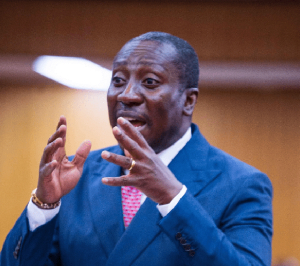One could emphatically state that Ghana is still not ready for investment. The answer lies within what is still a chaotic judicial system.
When Newspapers have to step in to ensure that citizens who are investors are not duped or when appeals by foreign investors who have been duped have to be handled by the President, it is clear that there are no systems in place for redress of problems related to investment.
Many have been defrauded in Ghana, several of these are not big time investors but rather hardworking Ghanaians, both local and foreign based. In most cases they do not have the time to pursue their claims in a system that victimizes the victim all over again. As such, when duped, people stop pursuing these criminals, but in a negative way resign from engaging in any meaningful investment activity in the country.
In a business sense, the approach of the country to investment simply can be seen as not taking care of your customer properly the first time. It will cause the company (Ghana) a lot of resources to regain the confidence and patronage of that customer, and this is something that Ghana must learn.
Our land system is the source of most evil in the country, and one would think there would be a comprehensive system being developed or an appraisal of what is being done, on an ongoing basis. Our land law is simply “jungle Law"-survival of the fittest. He who has the most time and can influence outcomes wins. This is going on today as we speak.
Rather, we see the finance minister, talking about getting into the business “advance rent and landlord laws”. This approach is the root of our problem. Always scratching the surface without getting to the root cause of our problems. If the question of “why” is asked enough times, we will get to the bottom of most issues, but assumptions have become a way of life for those in charge.
With respect to this landlord issue (http://www.ghanaweb.com/GhanaHomePage/NewsArchive/artikel.php?ID=33386), supply and demand has already brought to bear what is being suggested. Many cannot afford the advances so houses are not being rented. As such, today if you go out to rent, you will find people who are only accepting a few months rent, with landlord rules similar to those in the civilized world, where expectations of both tenants and landlords are spelled out. These properties however are not what the masses need and even getting into this business will not make Villas become studio apartments.
Of course there must be a law but it should not assume that it would make housing for the masses any easier. After all what could happen is once the government gets involved in this manner, considering what it takes to secure land, and the cost of building, who would want to build for rent. Remember business is about maximising one’s opportunity and if the government thinks it can do it cheaper, lead by example. Secure land, build and let private enterprise manage and eventually buyout this investment. Facilitate mass building.
Most importantly, government needs to focus and fix the chaotic system of securing land, provide some incentives for developers to build low cost housing, and create regional small claims courts that deal with crimes of this nature – that is a small claims courts modeled after that of the USA, perhaps. With such a system in place, investors in real estate simply can decide to use an existing property for whatever he or she desires.
We do not need big government in all our affairs. Today it is rent; tomorrow will it be hotel charges? Government’s role here should be to affect the demand and supply issues in this sector by creating an appealing environment. Government must not get involved directly in all affairs, as it will simply create a mess. You have not dealt with what is on your plate yet. We need to be encouraged to form associations of substance, that are representative of professional service providers, such as a landlords association, that may be regulated by way of an agency set up to assist both parties, being tenant and landlord.
Going back to the weak investment climate, the government needs to go back and examine records. The big investors who can afford to pursue fraudulent matters have resources, but in terms of Total FDI, what is their percentage, compared to that of Ghanaians who remit and invest one way or the other. Once this is done, it would occur to the government that contribution of the small investor must be of appreciated, and to ensure that the laws needed to expedite investment actually must be suitable for those within and without the economy. When we talk about investment, we forget, that everyone, either in Ghana doing business or from abroad investing, is an investor. The climate as such must be right for all.
To date, there are still many Ghanaians who do not and will not repatriate funds because they still are not confident about the environment. With Western economies showing dismal growth in many sectors, one would think, if risk were to be mitigated to a reasonable degree, capital would find its way into the economy, since returns are higher. However, the adage of “ the devil you know is better than the devil you do not know “ is working against us here. They would rather keep their money in the West and lose it than put it in countries where doing business is like hunting in a jungle. Survival of the fittest.
Agreed, that the economy is in tough shape and funds are hard to come by even if the government means well. However, with all these “brains” running around, one would expect thorough and quality frameworks, to guide this lawless environment. This takes well thought out plans, which is inclusive of those concerned the most, the locals.
Again I urge the government to take this issue of land seriously, and reorganize the Lands department to oversee land issues, property management issues with the appropriate infrastructure. What happened to the initiative by President Clinton, when he visited quite recently?
This talk about investment, on the government’s part, is currently directed to those with big funds who have the resources to actually control the outcome of their investment. For the “average Joe”, who is speculating, beware, because if you lose money, it will cost you twice as much to try and simply get what you lost, so what is the point of pursuing it. This does not auger well for the Ghanaian.
For anyone seeking to acquire scientific information on this argument, a simple survey as that shown below can help: (This is not meant to be a serious survey but to make a point)
1. Have you attempted to purchase land in the past 5 years?
2. Rate your experience- 1 through 5 with 5 being excellent
3. Were you duped?
4. Is the deal sealed or after purchase in year_______ you are still dealing with the issue in year ____________?
Of course there are smarter people in Ghana to develop these surveys, but the point of the matter is that for the mood to be right for investment, as argued over and over again, the needed ingredients are easy or relatively easy land acquisition, easy access to capital, and a well defined judiciary system to allow for quick redress of issues. As also argued before, our efforts are useless if we continue to lag in these areas, as a government. This is where your priorities need to be, not with landlord lease agreements.
Opinions of Saturday, 1 March 2003
Columnist: Folson, Ako


















